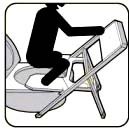|
Prostatitis - Prostate Gland InfammationProstatitis is inflammation of the prostate gland due to bacterial infection. It causes pain in the perineum (area between the genitals and the rectum), lower back, and often the penis and testes. Aside from pain, other symptoms include lowered libido, painful ejaculation, impotence, fever and chills. SIDENOTE Acute bacterial prostatitis (ABP) is caused by a bacterial urinary tract infection. Chronic bacterial prostatitis (CBP) is caused by recurrent bacterial infections. The cause of the third one - chronic pelvic pain syndrome (CPPS) - which accounts for 90% of prostatitis cases, is unknown. The main cause is bacterial infections. But more often than not, the exact cause cannot be determined. In many patients with prostatitis-like symptoms, there is no evidence of such infection in their prostate glands. This makes for a difficult diagnosis and treatment. Many urologists, not knowing the exact cause, will "blindly" prescribe antibiotics, which seldom work. Pudendal Neuropathy and Pudendal Nerve Entrapment Most urologists and those who suffer from prostate problems are not aware that pudendal neuropathy (PN) or pudendal nerve entrapment (PNE) causes similar symptoms. The reality is that once bacterial infection has been ruled out, the most likely cause is pudendal nerve entrapment. SIDENOTE Such damage to the pudendal nerve can show up in many ways, such as vague or sharp pains, burning or cold sensations, pin pricking, numbness, or the feeling of sitting on a lump. The pudendal controls bladder and prostate functions. It also carries sensations from the external genitals and surrounding areas. In many cases, the cause of a stretch injury is the descent of the pelvic floor, as a result of excessive straining for bowel movements. Several research findings have pointed to the connection between pudendal nerve injury and prostatitis and prostate problems in general: Roberts RO, Lieber MM, Bostwick DG, Jacobsen SJ: A Review of Clinical and Pathological Prostatitis Syndromes. Urology 49: 809-821, 1997: "Prostatitis-like urogenital pain and voiding (waste elimination) and sexual dysfunction are the hallmark of pudendal neuropathy." "Symptoms of prostatitis-like pain occur in 11% of American men, and approximately 95% of the men whose conditions are diagnosed as chronic prostatitis have NO evidence of bacterial infection or inflammatory cells in the prostatic fluid." Roberts RO, Prat-Pradal D, Labat JJ: Anatomic Basis Of Chronic Perineal Pain: Role Of The Pudendal Nerve. Surg Radiol Anat 20: 93-98, 1998: "Chronic perineal pain may be caused by pudendal nerve entrapment (PNE)." Amarenco G, Lanoe Y, Perrigot M, Goudal H: A New Canal Syndrome: Compression of The Pudendal Nerve in Alcock’s Canal or Perineal Paralysis of Cyclists [French]. Presse Med 16: 399, 1987: "Stretching of the pudendal nerve from chronic constipation causes (pudendal) neuropathy."
Strange indeed, when you consider that the sitting toilet is the root cause of the repeated strain and stress on the pelvic floor, and consequently, a stretch injury to the pudendal nerve.
|
The Best Toilet Converter in The World Today!


Helping People All Over
The World Achieve
Good Health Through
Correct Toileting Posture
Watch video on the
origin and story of
the Sandun-Evaco
toilet converter
All about Life,
Hope and Truth...
FREE:
One of the most
astounding books
you will ever read
in your life!








